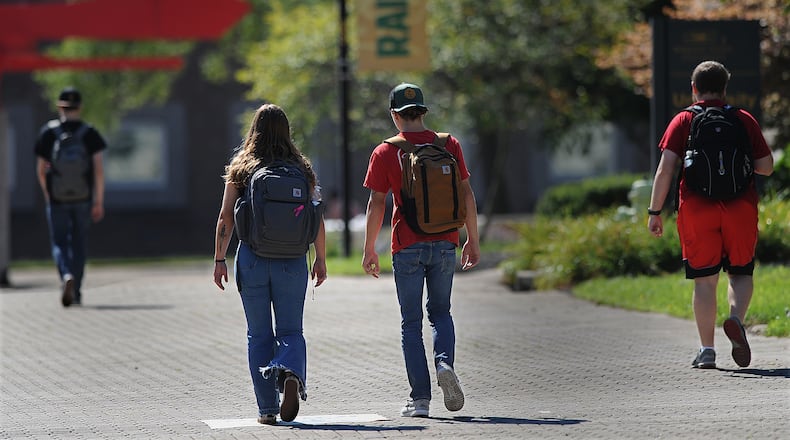The administration also changed the rules for loan repayment based on income, capping it at 5% of monthly income, and extended the deadline to begin repaying federal student loans to Jan. 1.
According to the Education Data Initiative, a nonprofit that collects education data, the average Ohioan has $34,721 in debt. A little more than 15% of the state’s population has student loan debt, according to the same source, and about half of Ohio’s student loan borrowers are under 35 years old. The state’s student loan total is about $62.3 billion.
People across the region disagreed on whether the administration’s plan was a good idea. Some borrowers said canceling student debt will help with other expenses, while others said it didn’t make sense for taxpayers to pay for loans that other people took out.
Samantha Panson, a 2017 Wright State University graduate who now works in nonprofits and development, said she was “thrilled” about student loan forgiveness, which will help both her and her sister.
Panson of Beavercreek said she took out Pell Grants to attend college as her family was low income. She now should qualify to have the rest of the debt she hasn’t paid, about $16,000, canceled.
“I feel like it’s gonna give me a lot more breathing room.” Panson said. “It’s gonna allow me to finally put some money into savings.”
She said her first goal is to save for a honeymoon, as she and her husband got married last year and haven’t been able to go on one yet.
But not everyone is thrilled about the idea. Russell Maas, a Washington Twp. resident, said he felt the Biden administration is putting out messages implying you don’t have to follow through with obligations.
“I don’t think that’s good overall policy for society or anybody,” Maas said.
Maas said he graduated with his master’s degree in the 1980s and now works in commercial real estate. He suggested lowering interest rates on federal student loans as an alternative to forgiving student debt.
Peter Nencka, an assistant economics professor at Miami University’s Farmer School of Business, said it’s unclear what some of the effects of the loan forgiveness program will be. But Nencka said it was likely that people who no longer need to repay the debt will have more money to spend on other goods and services.
“My sense is that this is a relatively small enough change, especially given that these loans have been paused for a significant amount of time already,” Nencka said, noting that student loan borrowers haven’t needed to make payments since March 2020. “I think it’s very difficult to know if or any effect there would be on inflation.”
Kevin Willardsen, an associate economics professor at Wright State University, said he expects little to no changes, at least immediately. But he said the cost of forgiving student loan debt will need to come from somewhere. He agreed with Nencka that people will likely see little inflation immediately from forgiving student debt.
“The losers of this program are the people that are actually going to end up caring carrying the disproportionate burden,” said Willardsen. “They are people that have never been to college, or have already paid off their debts, and they’re going to pay for this through a combination of either higher taxes or inflation depending on how this entire program eventually gets monetized.”
The debt forgiveness is expected to apply only to those currently holding student debt. But if you’ve voluntarily made payments since March 2020, when payments were paused, you can request a refund for those payments, according to the Federal Office of Student Aid. Contact your loan servicer to request a refund.
The White House is expected to face lawsuits over the plan, because Congress has never given the president the explicit authority to cancel debt.
About the Author

